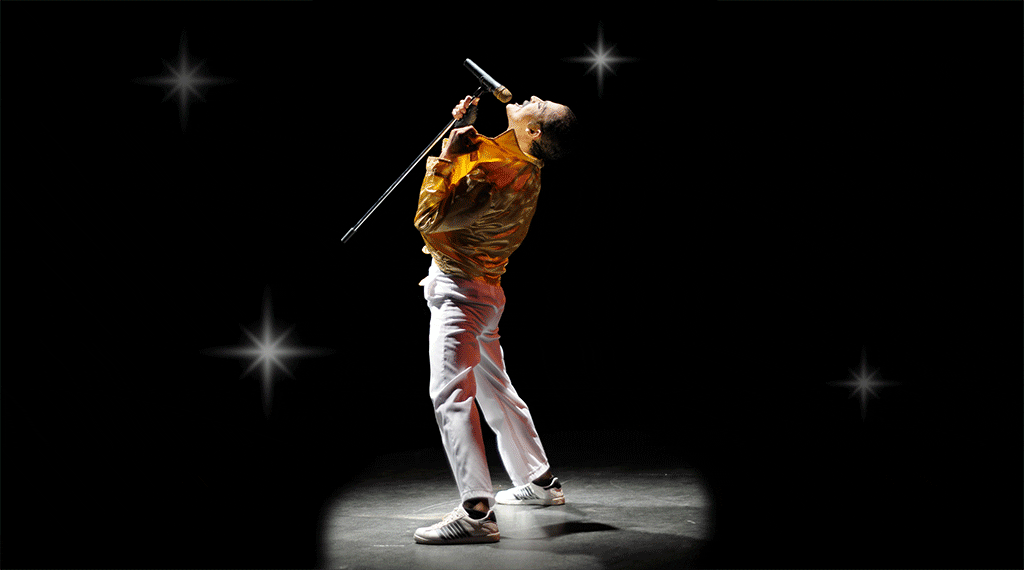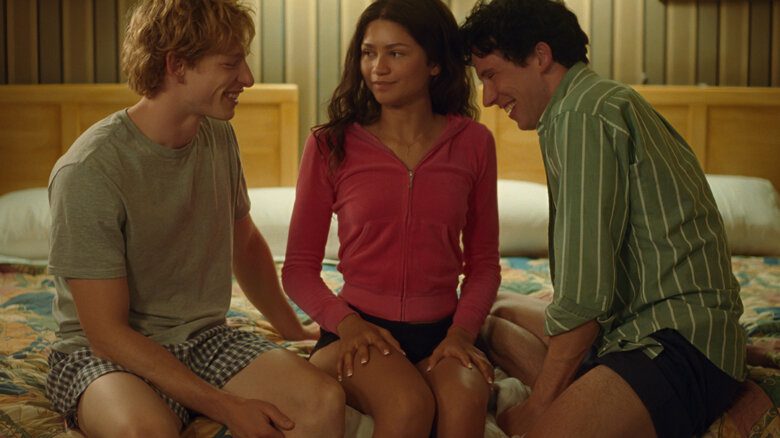Popular opinion (and mine too): Bohemian Rhapsody was a let down.
It did not defy the laws of gravity and we were not rocked. It’s fair to say it bit the dust. But let’s move past the film’s flaws to remember the most extraordinary part of the true story: Queen, a band loved by straight white men, had a queer brown man at its helm.
Bohemian Rhapsody, starring Mr Robot’s Rami Malek, is a biopic of Queen frontman Freddie Mercury and the story of the band’s meteoric success starting in the early 1970s, and ending with its epic 1985 performance at Live Aid. It follows the band through the creation of its most iconic songs, as well as a few of the relationships throughout Mercury’s life — a long-term romance then platonic friendship with a woman named Mary Austin and others with men. This is mostly accurate, but the trouble is that the film avoids every opportunity to not show intimacy between two men.
For example, in one scene where Mercury is on tour and talking lovingly to Austin (Lucy Boynton) on a payphone, he is distracted by a man. They stare each other down as the man goes into the washroom. The camera goes back to Mercury’s face. We get it.
As Guy Branum said on Twitter, “I just saw Bohemian Rhapsody and learned you contract AIDS from lingering eye contact with unnamed male extras.” These are a few of many vague admissions of Freddie’s sexuality made through selective storytelling that ultimately erases love and sex between men yet lingers in the tender moments between Mercury and Austin.
The queer erasure of Bohemian Rhapsody is infuriating, and rightfully should be — the band admitted to toning down Mercury’s infamously wild, lavish lifestyle for the sake of making a “family friendly” movie. But the film doesn’t and cannot define, contain or erase Mercury’s queerness or brownness, which have already concretely defined and inspired his devoted fans.
In itself, Mercury’s path is a revolutionary act, one that many queer people of colour know well. Born Farrokh Bulsara in Stone Town, Zanzibar, he was of Parsi descent and his family practised Zoroastrian religion. His parents were born in British-ruled India, and the Bulsaras and a teenage Mercury fled to Britain in 1964 following the Zanzibar revolution which killed thousands of Indians and Arabs.
Mercury’s background contributed to his complex identity: he had protruding teeth (he had four extra incisors) that he often tried to cover up. As a Parsi, he identified more with his Persian ancestry than with his parents’ Indian heritage. Britain was also riding a wave of anti-brown sentiment, which increased in 1968 (two years before Queen was formed) following Conservative politician Enoch Powell’s “Rivers of Blood” speech criticizing Britain’s influx of immigration. Not to mention, that becoming a musician — and a rock musician at that — is not the typical career for brown boys. His parents pushed him to apply for jobs in the hopes he’d take an interest in something besides music, though they were very proud of his success.
Oh, and he was definitely queer, having many sexual relationships with men and women. Austin, who was engaged to Mercury until 1973, said in a documentary that when Mercury came out to her as bisexual, she told him she believed he was gay. Mercury and Paul Prenter, who became his manager in 1977, also had a sexual relationship. Finally, there was Jim Hutton, who Mercury met at a gay club in London and spent his last years with — they both wore wedding rings although same-sex marriage was not legal at the time.
Mercury’s sexuality made Queen’s music attainable for queer fans who were hesitant or turned off by the aggressiveness of mainstream rock music, which was also overwhelmingly white, but who could read queerness into the band’s vivacious performances (Mercury in lively costumes or half-naked), interviews and songs. Mercury, known for saying outrageous things in interviews, once said “Oh my dear, we’re the bitchiest band on earth,” and also joked that the band was doing well for “four aging queens.” Many songs have gone on to become gay anthems or favourites, including “Good Old-Fashioned Lover Boy,” “Body Language” and “I Want to Break Free,” accompanied by a music video of the band in drag. The band experimented with sounds not characteristically rock-n-roll: opera, pop, disco, funk.
Queen is still riding a wave of seemingly never-ending fame: the film, sold-out tours with Adam Lambert (also a queer man), a 16-year running of the musical We Will Rock You and chart-topping albums. Yet despite its subversiveness and its appeal to the outcasts, Queen’s legacy carries on largely through white, straight men — the popular boys at school, the troublemakers at the frat house who get off with a “warning,” the dude angry at the way the world is changing. Men who would likely reject or condemn a man like Mercury in real life. Men who would vote against LGBTQ rights.
In today’s America, arguably the country where Queen has had the most success, the band does not fit the US’s post 9/11 culture. Brown men, regardless of skin colour, ethnicity and nationality are targeted and viewed as suspects. Basic human rights such as same-sex marriage have only happened in the last few years, while others, such as trans bathroom bills, continue to divide states. President Donald Trump continues to roll back LGBTQ protections and to write certain groups out of existence. White nationalists and far-right extremism continues to flourish. Mercury’s immorality is not just proof of the hypocrisy of Queen’s more conservative and right-wing fans, but a powerful reminder that against hate, history is ours for the making. AKA: forever is ours today.
It’s all the more reason that Mercury’s queerness is so iconic, and that maybe, just maybe, we can forgive Bohemian Rhapsody for its vagueness over Mercury’s sexuality. After all, his own bandmates weren’t sure if he was gay. Yet his open fluidity — his refusal to label himself or to give vulturous press and those around him a part he held dear and private — should be celebrated, not squeezed into one single identity.
Mercury is a success story despite all odds, one that can’t be manipulated into a trope or tragic story. That’s not to say he didn’t struggle with his sexuality and how it would affect his career. Nor is that to deny his experience of being HIV-positive — he was diagnosed in 1987, at the height of both the epidemic among gay men in the West and the stigma surrounding HIV/AIDS.
But he lived life on his terms, refusing to give fuel to homophobes and xenophobes who were waiting to twist his life into something monstrous. No moment was more true than when Mercury, who told loved ones he didn’t want to be the “poster boy” for AIDS, chose to disclose his diagnosis in November 1991 in a press release. He died the next day.
Next week marks 27 years since Mercury’s death, and he continues to be an icon for queer, brown, and music communities fans alike. The band is still beloved across the world — a bronze statue of Mercury stands in Montreux, Switzerland; cover bands and impersonators continue to please; “We Will Rock You” and “We Are the Champions” are still fan favourites at sports events; celebrities are influenced by the band; and album sales past 35 million in the US alone, with half bought since Mercury’s death. In his hometown of Zanzibar, which condemns men to a lifetime in prison for same-sex acts, some queer folks look to him with hope and pride.
While we don’t need to like Bohemian Rhapsody, we should also acknowledge that a film has finally been made celebrating the power of a queer brown man to make millions of white and straight people bop their heads, sing out loud and stomp their feet, even in today’s political climate. And that’s definitely a kind of magic.


 Why you can trust Xtra
Why you can trust Xtra


